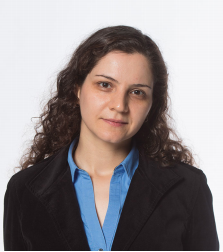CADMY Brings Together Economists and Computer Scientists to Push Frontiers of Research

NEW HAVEN, CT — The Center for Algorithms, Data, and Market Design at Yale (CADMY) is hosting the 25th ACM Conference on Economics and Computation (EC'24) this week, bringing together hundreds of economists and computer scientists to push the frontiers of research in areas like market design, machine learning, and information design.
The event features technical paper presentations, in-person workshops on topics including decentralized finance, game theory, gender inclusion, and incentives in academia, and plenary talks by Mikhail Belkin (UC San Diego), Federico Echenique (UC Berkeley), Adam Kalai (Open AI), and Garrett van Ryzin (Amazon).
With Yale hosting this year’s conference, many faculty members are helping lead and coordinate the event, including Dirk Bergemann (Economics) serving as the General Chair, and Yang Cai (Computer Science) and Vahideh Manshadi (SOM) serving as the Local Chairs.
A significant share of the conference is devoted to researchers presenting new work, and this year’s technical program features over 200 paper presentations, including many by Yale faculty members, postdocs, and graduate students. The conference features cutting-edge research at the intersection of economics and computer science, including mechanism design, information design, cryptocurrency, learning in games and economic systems, and LLMs.
Launched in fall 2022, CADMY initiates and supports research and teaching around fundamental questions at the intersection of computer science, data science, and economics. Hosting this year's ACM EC Conference is one of CADMY's first major initiatives, aligning with its objective to develop new analytical and mathematical foundations while also exploring societal applications of research.
The full conference program is available here, and we highlight presentations by members of the Yale community below.

CADMY is thrilled to be hosting this year’s ACM Conference on Economics + Computation. In its 25th year, this conference brings together the best minds and most exciting problems in academic and industry. This year’s conference themes include plenary sections on resilient supply chains, large language models, and matching markets. As a new research center at Yale, CADMY is building research infrastructure and funding to be able to push forward these fields, and I’m excited to see so many contributions from the Yale faculty and graduate students across many departments at the conference.
Robust Advertisement Pricing
Authors: Tan Gan (Yale University), Hongcheng Li (Yale University)
Abstract
We consider the robust pricing problem of an advertising platform, which can charge a seller for distributing the hard evidence of the seller's quality to consumers prior to subsequent trading between the seller and consumers. The optimal strategically robust pricing strategy features increasing marginal prices for accessing additional consumers. It is optimal to prioritize attracting sellers of higher quality into the service with higher rent.
Optimal Scoring for Dynamic Information Acquisition
Authors: Yingkai Li (Yale University), Jonathan Libgober (University of Southern California)
Abstract
A principal seeks to learn about a binary state and can do so by enlisting an agent to acquire information over time. The agent learns about this state privately, and his effort choices are unobserved by the principal. The principal can reward the agent with a prize of fixed value as a function of the agent's sequence of reports and the realized state. We identify conditions that each individually ensure that the principal cannot do better than by eliciting a single report from the agent after all information has been acquired, and show that such a static contract is suboptimal under sufficiently strong violations of these conditions.

EC has always been my favorite conference each year because it brings together the Operations, CS, and Econ communities in a unique way. At Yale, we value bridging disciplines, so EC is an ideal venue for this interdisciplinary exchange. I'm proud of my current and former PhD students who will present their thesis work at the EC main conference. Soonbong Lee, a current PhD student at Yale SOM in Operations, will present our joint work on designing matching algorithms to improve the process of refugee resettlement in the U.S. (see the paper here, and a Yale Insight article here). Scott Rodilitz, a former Yale SOM PhD student in Operations and now an assistant professor at UCLA Anderson, will present our joint work on the role of commitment in designing two-sided markets with a focus on volunteer labor (see the paper here).
Algorithmic Information Disclosure in Optimal Auctions
Authors: Yang Cai (Yale University), Yingkai Li (Yale University), Jinzhao Wu (Yale University)
Abstract
This paper studies a joint design problem where a seller can design both the signal structures for the agents to learn their values, and the allocation and payment rules for selling the item. Our main result is a polynomial-time approximation scheme (PTAS) for computing the optimal joint design with at most an ϵ multiplicative loss in expected revenue. Moreover, we show that in our joint design problem, the seller can significantly reduce the information rent of the agents by providing partial information, which ensures a revenue that is at least 1−1/e of the optimal welfare for all valuation distributions.
From Doubt to Devotion: Trials and Learning-Based Pricing
Authors: Tan Gan (Yale University), Nicholas T. Wu (Yale University)
Abstract
How can the seller leverage data on consumer preferences and the buyer’s ability to learn, and what are the welfare implications in equilibrium? An informed seller designs a dynamic mechanism to sell an experience good. The seller has partial information about the product match, which affects the buyer’s private consumption experience. We characterize equilibrium mechanisms of this dynamic informed principal problem.
A Unified Approach to Second and Third Degree Price Discrimination
Authors: Dirk Bergemann (Yale University), Tibor Heumann (Pontificia Universidad Catolica Chile), Michael Wang (Yale University)
Abstract
The welfare implications of a seller's decision to offer different products or different prices to different market segments is a classic and important problem in economics. The practice of offering different products to consumers in distinct market segments, often referred to as second degree price discrimination—is known to increase or decrease consumer surplus. The same holds for third degree price discrimination, in which sellers offer the product with varying prices.
The objective of this paper is to completely describe how the information that allows the seller the segment the market can affect the distribution of social surplus. In the paper we offer a complete characterization of the implications of information for social surplus. We also offer an algorithm that allows us to construct the exact boundaries of the social surplus.
STRIDE: A Tool-Assisted LLM Agent Framework for Strategic and Interactive Decision-Making
Authors: Zhuoran Yang (Yale University) Joint work with Chuanhao Li (Yale University), Runhan Yang (The Chinese University of Hong Kong), Tiankai Li (University of Science and Technology of China), Milad Bafarassat (Sabanci University), Dirk Bergemann (Yale University)
Abstract
Large Language Models (LLMs) like GPT-4 have revolutionized natural language processing, showing remarkable linguistic proficiency and reasoning capabilities. However, their application in strategic multi-agent decision-making environments is hampered by significant limitations including poor mathematical reasoning, difficulty in following instructions, and a tendency to generate incorrect information. This paper presents a novel LLM agent framework equipped with memory and specialized tools to enhance their strategic decision-making capabilities. We deploy the tools in a number of economically important environments, in particular bilateral bargaining and multi-agent and dynamic mechanism design.

It’s very exciting to host the ACM EC Conference at Yale. The interdisciplinary research between economics and computer science has been very vibrant at Yale. I believe hosting the conference provides an excellent opportunity for students and faculty to interact with researchers from around the world and to showcase our progress in both research and building a community to foster this interdisciplinary effort, such as the establishment of the Center for Algorithms, Data, and Market Design (CADMY).
About CADMY
The Center for Algorithms, Data, and Market Design at Yale (CADMY) serves as a cutting-edge research hub for faculty and graduate students working at the intersection of economics, computer science, and data science.
Launched in fall 2022, CADMY builds on momentum from other initiatives in the Economics Department and across the Yale community. These initiatives include the Digital Economy Project recently launched by the Tobin Center for Economic Policy, the Thurman Arnold Project at Yale School of Management, and the Information Society Project at Yale Law School.
With a variety of multidisciplinary research topics including automated market making on blockchains, optimal taxation of carbon in unequal society, and market design for social good, our groundbreaking research aims to advance understanding in the fields of economics, computer and data sciences, and provide practical insight for policy making.
About ACM
The Association for Computing Machinery (ACM), the world's largest educational and scientific computing society, delivers resources that advance computing as a science and a profession. ACM provides the computing field's premier Digital Library and serves its members and the computing profession with leading-edge publications, conferences, and career resources.
Since 1999, the ACM Special Interest Group on Economics and Computation (SIGecom) has sponsored the leading scientific conference on advances in theory, empirics, and applications at the interface of economics and computation. The 25th ACM Conference on Economics and Computation (EC’24) will feature invited speakers, a technical program of submitted paper presentations, workshops, and posters.